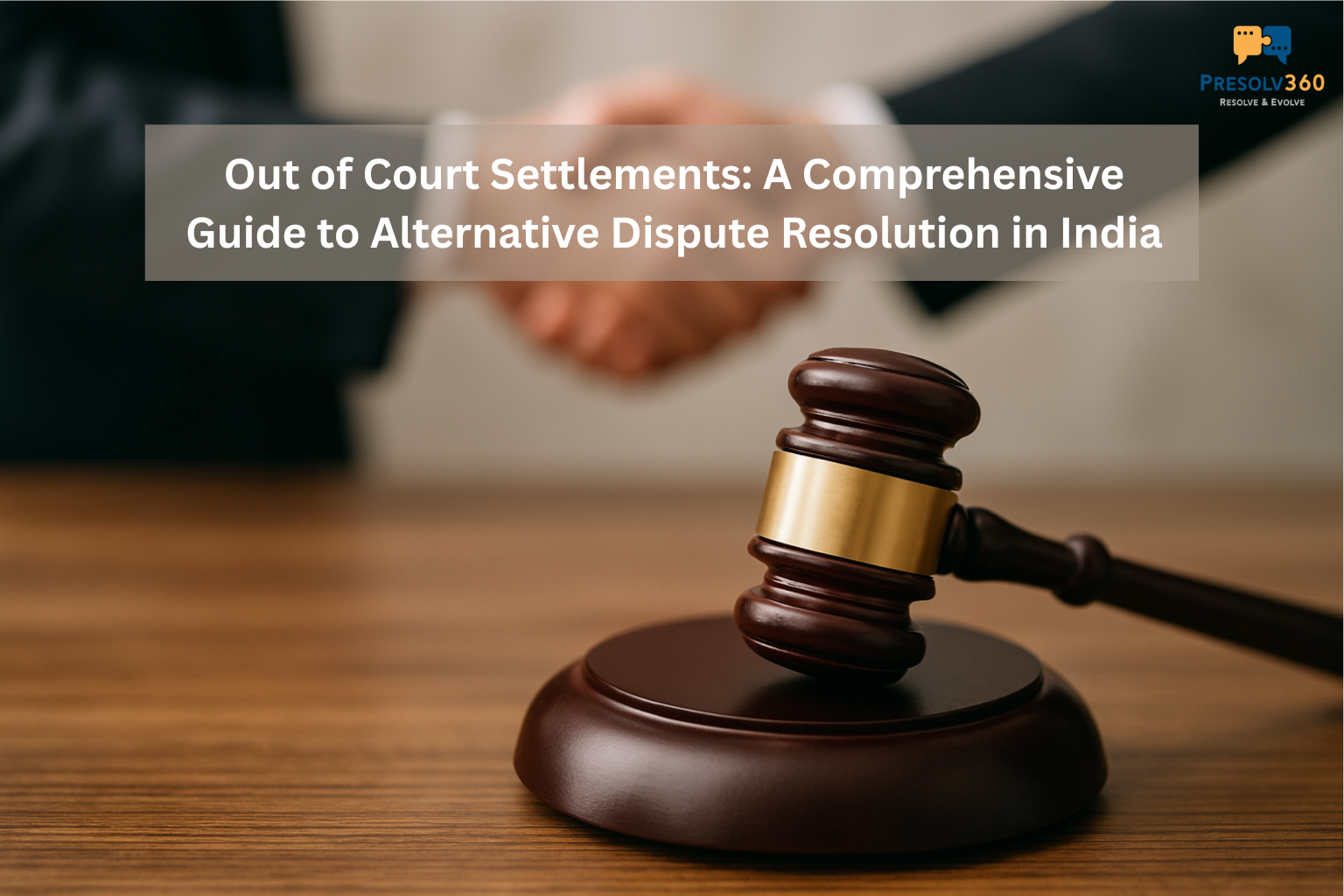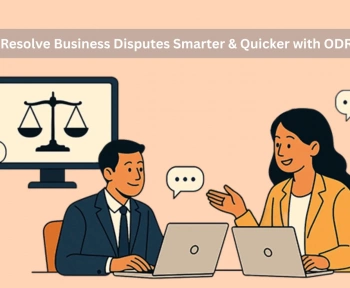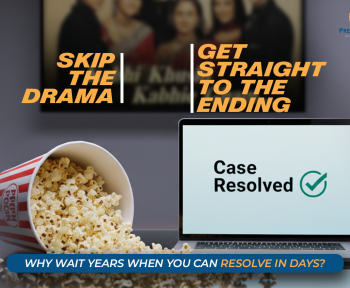Overview of Out-of-Court Settlements – Importance of ADR Methods
In the evolving landscape of the Indian legal system, out-of-court settlements have emerged as an efficient alternative to traditional litigation. These settlements, part of the broader umbrella of Alternative Dispute Resolution (ADR), provide parties with a flexible, cost-effective, and faster route to resolve disputes without prolonged courtroom battles.
ADR methods such as mediation, arbitration, conciliation, and negotiation are reshaping how conflicts are addressed in civil, commercial, family, and employment matters across India.
The significance of out-of-court settlements in India lies in their ability to reduce the burden on courts, maintain confidentiality, preserve relationships, and deliver justice in a more amicable and time-sensitive manner.
What is an Out of Court Settlement?
Definition and Key Elements
An out-of-court settlement is a mutually agreed resolution between disputing parties without the involvement of a public court judgment. Instead of a judge or jury deciding the outcome, the parties voluntarily enter into a settlement agreement that outlines the terms of resolution.
How Out-of-Court Settlement Differs from Court Proceedings
- Confidentiality: Unlike court trials, settlements remain private.
- Time-Saving: Resolutions occur faster as parties bypass procedural delays.
- Cost-Efficient: Reduces litigation fees, court costs, and prolonged attorney expenses.
- Control: Parties retain more control over the outcome than they would in a judicial verdict.
In essence, an out-of-court settlement empowers individuals and businesses to craft solutions tailored to their unique circumstances without rigid legal formalities.
How Do Out-of-Court Settlements Work?
The process of settling outside the court typically involves the following steps:
- Initiation of Dialogue: One party initiates a proposal to resolve the issue outside court through a formal communication or legal counsel.
- Engaging a Facilitator: In many cases, a neutral third party, such as a mediator or arbitrator, is engaged to facilitate constructive discussions.
- Negotiation and Discussion: Both parties present their concerns, evidence, and expectations. Negotiation continues until a mutually acceptable solution is reached.
- Drafting the Settlement Agreement: Once terms are finalized, they are documented in a legally binding settlement agreement, signed by both parties.
- Execution and Closure: The agreement is implemented, and any pending litigation (if initiated) is withdrawn or closed upon the fulfillment of the settlement terms.
In many civil and commercial matters, settlement claims achieved through out-of-court mechanisms are considered enforceable under law, particularly when backed by written agreements.
Which Cases Can Be Solved Outside the Court?
Common Examples of Disputes Suitable for Out-of-Court Settlement
The question “Which case can be solved outside the court?” finds its answer in the wide range of disputes eligible for ADR in India. Here are typical examples:
- Commercial Disputes: Breach of contract, partnership disagreements, business debts, and supplier disputes.
- Family Disputes: Divorce, child custody, alimony, and property division matters.
- Employment Disputes: Wrongful termination, harassment claims, and wage conflicts.
- Consumer Complaints: Service deficiencies, faulty products, and refund claims.
- Property Matters: Real estate transactions, landlord-tenant disputes, and partition suits.
- Personal Injury Claims: Medical negligence, motor accident compensation, and workplace injuries.
In India, institutions such as Lok Adalats, Mediation Centres, and Arbitration Tribunals actively encourage and oversee these settlement processes.
Key Benefits of Choosing Out-of-Court Settlements
- Speedy Resolution
Settlements outside court typically conclude within weeks or a few months, compared to the years often taken by court litigation.
- Reduced Legal Costs
Eliminates various court fees, long hours of legal counseling, and resource-heavy trials.
- Preservation of Relationships
Especially vital in family and business matters where maintaining long-term relationships is important.
- Confidentiality
The terms of a settlement agreement remain private, protecting the reputation and privacy of all parties involved.
- Flexibility and Creative Solutions
Parties can propose creative, non-monetary solutions not typically granted by courts.
- Voluntary and Less Adversarial
Settlements are based on mutual consent, which can reduce hostility and foster better post-settlement dynamics.
Why Choose Out of Court Settlements?
Out-of-court settlements represent a progressive shift in India’s legal ecosystem, prioritizing efficiency, accessibility, and peaceful resolution over protracted legal battles. Whether you are a business owner facing a contract dispute, a couple navigating a separation, or an employee resolving a workplace grievance, out-of-court settlement in India offers a practical, respectful, and empowering path forward.
The flexibility of this method, along with rising institutional support for ADR frameworks, makes it a preferred dispute resolution mechanism for millions today. It allows parties to reach legally enforceable settlements on their terms, saving precious time, money, and emotional energy.
As a future-forward solution in modern legal affairs, out-of-court settlements are not just an alternative—they are a strategic choice.
Resolve Your Disputes Smarter with Presolv360
Why wait years in court when you can resolve your dispute in days? Presolv360 offers fast, confidential, and legally binding out-of-court settlements through its online dispute resolution (ODR) platform. Whether it’s a business conflict, financial matter, or property issue, our neutral experts help you reach a fair settlement without stepping into a courtroom.




